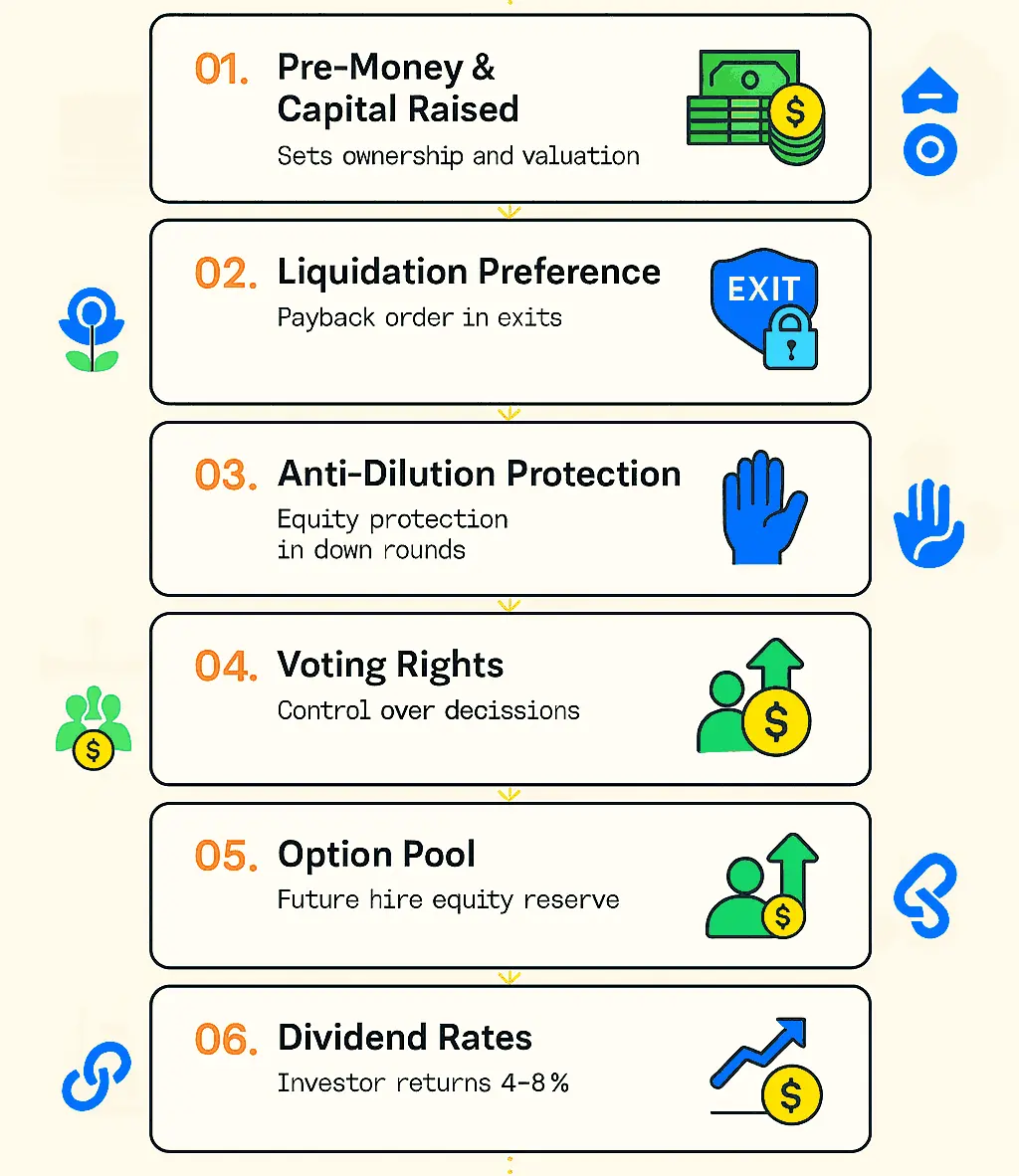Securing venture capital is a milestone for many startups. However, the process often introduces founders to complex legal documents known as term sheets. These agreements outline the key terms and conditions of an investment deal, serving as a roadmap for both parties. 588 anonymised equity term sheets were analyzed by HSBC, representing one-third of all UK venture capital equity deals, highlighting the importance of understanding these documents.
Your grasp of venture capital term sheets can be enriched by exploring the detailed analysis in types of startup funding. This analysis highlights diverse approaches to securing capital. This guide aims to simplify the jargon and provide actionable insights, empowering founders to negotiate confidently and make informed decisions.
What Founders Need to Know: Venture Capital Term Sheet Explained
A venture capital (VC) term sheet is a foundational document in startup financing. It outlines the key terms and conditions of a proposed investment. While it sets the stage for negotiations between startups and investors, it’s important to note that term sheets are non-binding agreements. This means the terms outlined can change until they are finalized in legally binding contracts.
The primary purpose of a term sheet is to serve as a blueprint for the investment process. It provides clarity on critical aspects such as valuation, equity distribution, board composition, and investor rights. These components, while standardized to some extent, can vary in interpretation depending on the parties involved.
Confidentiality and exclusivity provisions are often included in term sheets to protect sensitive information and ensure focused negotiations. Confidentiality clauses prevent either party from disclosing details of the agreement, while exclusivity provisions restrict the startup from seeking alternative investors for a specified period. These elements foster trust and streamline the investment process.
For startups preparing to discuss term sheets, understanding how to attract venture capitalists can be a valuable first step. The discussion in how to attract venture capitalists offers practical strategies that resonate with the negotiation aspects intrinsic to term sheet discussions.
Ultimately, VC term sheets are a critical milestone in securing funding, providing a structured framework for collaboration between startups and investors. By grasping their components and implications, founders can approach negotiations with confidence and clarity.
Key Elements of VC Term Sheets for Startup Funding
A venture capital (VC) term sheet serves as the foundation for negotiations between investors and startups, outlining the key terms of a potential investment. Understanding its essential components is critical for founders aiming to secure funding while protecting their interests.
1. Investment Amount and Pre-Money Valuation
The term sheet specifies the investment amount, the capital the VC firm commits, and the pre-money valuation, which determines the startup’s worth before the investment. These figures directly influence the percentage of equity the investor will receive, making them pivotal in shaping the deal. In Q1 2025, the 17.9% median dilution for Series A rounds was noted, down from 20.9% a year earlier, indicating a trend towards more favorable terms for startups.
2. Liquidation Preferences
Liquidation preferences dictate how proceeds are distributed in the event of a company sale or liquidation. Investors often demand priority in recovering their investment, either through a multiple of their initial funding or a percentage of the remaining proceeds. Founders must carefully assess these terms to avoid unfavorable outcomes during exits.
3. Investor and Founder Rights
The document also defines rights for both parties, including voting rights, board representation, and anti-dilution provisions. These clauses ensure investors have a say in major decisions while safeguarding founders against excessive equity dilution in future funding rounds.
4. Governance and Exit Terms
Governance terms outline decision-making processes, while exit terms specify conditions for selling the company or going public. These sections are crucial for aligning long-term goals between founders and investors.
5. Importance of Due Diligence
Precise definitions and thorough due diligence are essential to prevent misunderstandings. Ambiguities in term sheets can lead to disputes, making it vital for both parties to review every clause meticulously.
For further insights into how funding stages influence term sheet structures, clarifications on financing rounds are presented in series a b c funding explained, which helps illuminate how different stages can influence the structure of term sheets.
Understanding these elements empowers startups to negotiate effectively and build sustainable partnerships with investors.
Key Clauses in VC Term Sheets to Watch Out For
Understanding the clauses in a venture capital (VC) term sheet is crucial for startups and investors alike. These agreements outline the terms of investment and safeguard the interests of both parties. Below, we explore the most common clauses and their implications.

1. Money Raised and Pre-Money Valuation
The “money raised” clause specifies the amount of capital the investor commits to the startup. Closely tied to this is the “pre-money valuation,” which determines the startup’s worth before the investment. Together, these clauses set the foundation for equity distribution and ownership percentages.
2. Liquidation Preferences
Liquidation preferences dictate the order and amount investors receive in the event of a company sale or liquidation. For example, preferred shares—used in 83% of VC deals in 2023 compared to 71% in 2022—often come with a liquidation preference that ensures investors recover their initial investment before other shareholders.
3. Anti-Dilution Provisions
Anti-dilution mechanisms protect investors from equity dilution during future funding rounds. These provisions adjust the investor’s shareholding if the company issues new shares at a lower valuation. While beneficial for investors, startups must carefully assess the long-term impact on their equity structure.
4. Voting Rights
Voting rights clauses define the investor’s ability to influence key business decisions. These rights can range from board representation to veto power over significant actions like mergers or acquisitions. Balancing voting rights ensures that investors have a say without stifling the startup’s autonomy.
5. Option Pool
The option pool is another critical element, often factored into pre-money valuations. It reserves equity for future hires and incentivizes employees. For a deeper understanding, explore how option pools factor into pre-money valuations.
5. Dividend Rates
Preferred shares may also include annual dividends, typically ranging from 4% to 8%. While dividends provide investors with regular returns, startups should evaluate their financial capacity to meet these obligations.
6. Connecting Term Sheet Clauses to the Broader Funding Process
Understanding these clauses equips startups to negotiate effectively and avoid potential pitfalls. Investors, on the other hand, can ensure their interests are protected while fostering a collaborative relationship with the startup.
For a comprehensive guide to securing venture capital, check out our resource on how to secure venture capital funding. This article connects the dots between term sheet clauses and the broader funding process.
Learn from Real VC Term Sheets with Case Studies
Understanding venture capital (VC) term sheets becomes easier when you examine real-world examples and case studies. Modern VC term sheets are evolving, with many investors favoring shorter, more transparent documents that simplify negotiations. These streamlined agreements, often averaging around 10 pages, aim to reduce complexity while maintaining clarity for both founders and investors.
Templates provided by leading organizations, such as the Y-Combinator Series A term sheet, offer valuable insights into structuring these agreements. They serve as excellent starting points for founders seeking to understand the essential clauses and terms.
Real-world examples further illustrate the practical implications of term sheet clauses. For instance, Datavations leveraged Flowlie's AI-powered platform to streamline term sheet negotiations, investor targeting, and deal preparation while maintaining business operations. This approach enabled them to close an oversubscribed $17M Series A with a 3.3x valuation step-up, saving 250 hours of executive time.
Similarly, Coworker.ai negotiated a term sheet structure with former Google SVP Jeff Huber leading through Triatomic Capital, focusing on AI-native productivity tools market positioning. This resulted in securing a $13M seed round with notable VC syndicate participation and launching an AI agent serving 25+ companies across multiple industries.
Before diving into term sheet negotiations, it’s essential to familiarize yourself with the venture capital due diligence process, which often precedes these discussions.
How to Negotiate Fair VC Term Sheets
Securing a fair VC term sheet requires a combination of preparation, strategy, and expert guidance. Founders must focus on protecting their interests while ensuring the agreement aligns with their long-term goals.
Prioritize Key Terms
When reviewing a term sheet, founders should identify and prioritize critical elements such as valuation, equity ownership, liquidation preferences, and board composition. These terms directly impact the company’s control and financial outcomes. For example, avoiding unfavorable liquidation preferences can prevent disproportionate payouts to investors during an exit.
Engage Legal Experts
Hiring a legal advisor experienced in venture capital negotiations is essential. They can help founders understand complex clauses and ensure the agreement is fair. Defined terms like “participating preferred” or “anti-dilution provisions” can have significant implications, and expert guidance ensures these are addressed appropriately.
Create Competitive Tension
Engaging with multiple investors simultaneously can strengthen a founder’s position. As highlighted by the trend of Bidding Wars, increased VC interest in deals can lead to more favorable terms. Founders should use this competitive environment to negotiate better offers and avoid settling prematurely.
Avoid Restrictive Clauses
Restrictive clauses, such as lengthy exclusivity periods, can limit a founder’s ability to explore other funding options. Shorter exclusivity periods allow founders to keep their options open and potentially secure better investment offers.
Utilize Tools for Organization
Managing term sheet negotiations can be overwhelming. Tools like Airtable help founders track ongoing discussions, organize due diligence documents, and maintain clarity throughout the process.
- Prioritize Key Terms
- Engage Legal Experts
- Create Competitive Tension
- Avoid Restrictive Clauses
- Utilize Tools for Organization
- Benchmark Term Sheet Terms Against Industry Standards
Explore the Full VC Term Sheets Resource Library
Dive into a comprehensive exploration of VC term sheets with our full research library report. This resource is designed to provide actionable insights into emerging trends and industry shifts, empowering readers to make informed decisions in venture capital.
The report highlights key developments shaping the VC landscape, such as the increasing sector concentration in AI and Climate Tech. These specialized industries are attracting targeted VC deals, reflecting a growing focus on innovation-driven investments. Additionally, the rise of international syndicates is reshaping funding opportunities, with cross-border deals and global capital pools becoming more prevalent.
For those seeking deeper engagement, the library offers data-driven insights that go beyond surface-level analysis. Whether you’re interested in understanding the nuances of term sheet negotiations or exploring the strategic implications of these trends, this resource is your gateway to advanced knowledge.
Conclusion
Securing favorable funding terms begins with a well-structured and transparent term sheet. Throughout this blog, we’ve explored essential strategies and insights that can help startups negotiate effectively, align with investor expectations, and build lasting partnerships. From understanding key clauses to prioritizing clarity in communication, these approaches are vital for achieving mutually beneficial agreements.
A thoughtfully crafted term sheet not only sets the foundation for successful fundraising but also ensures long-term alignment between founders and investors. If you’re ready to elevate your fundraising efforts, we at Qubit Capital can help. Explore our Fundraising Assistance service for tailored support designed to meet your unique needs. Let’s work together to turn your vision into reality.
Key Takeaways
- VC term sheets serve as a critical blueprint for investment deals.
- Understanding each clause is essential for protecting founder interests.
- Clear and transparent term sheets lead to more favorable negotiations.
- Real-world examples provide actionable insights into effective term sheet structuring.
- Effective negotiation combined with legal guidance is key to securing fair terms.
Frequently asked Questions
What is a venture capital term sheet?
A venture capital term sheet is a non-binding document that outlines the key financial terms, investor rights, valuation figures, and exit conditions of an investment deal. It serves as a roadmap for both parties, ensuring aligned expectations and clear financial arrangements. HSBC analyzed 588 anonymised equity term sheets, representing one-third of all UK venture capital equity deals, highlighting their importance.






